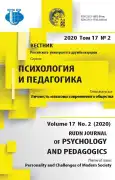The question of school language in multilingual societies: the example of Ghana
- Authors: Appiah S.O.1, Ardila A.1,2
-
Affiliations:
- I.M. Sechenov First Moscow State Medical University
- Albizu University
- Issue: Vol 17, No 2 (2020): PERSONALITY AND CHALLENGES OF MODERN SOCIETY
- Pages: 263-272
- Section: CROSS-CULTURAL PSYCHOLOGY AND MULTICULTURAL EDUCATION
- URL: https://journal-vniispk.ru/2313-1683/article/view/325950
- DOI: https://doi.org/10.22363/2313-1683-2020-17-2-263-272
- ID: 325950
Cite item
Full Text
Abstract
Keywords
About the authors
Samuel Opoku Appiah
I.M. Sechenov First Moscow State Medical University
Email: agyapoku27@gmail.com
Ghanaian student at the master program “Psycholinguistics of Intercultural Communication” 8 Trubetskaya St, bldg. 2, Moscow, 119991, Russian Federation
Alfredo Ardila
I.M. Sechenov First Moscow State Medical University; Albizu University
Email: ardilaalfredo@gmail.com
PhD, is a Professor at the Institute of Linguistics and Intercultural Communication, I.M. Sechenov First Moscow State Medical University (Moscow, Russia); Distinguished Professor at Albizu University (Miami, USA). 8 Trubetskaya St, bldg. 2, Moscow, 119991, Russian Federation; 2173 NW 99th Avenue, Miami, Florida, 33172, United States of America
References
- Andoh-Kumi, K. (1994). Topics in Ghanaian language education (unpublished master’s thesis). University of Ghana, Legon, Ghana.
- Anyidoho, A., & Dakubu, M.K. (2008). Ghana: Indigenous languages, English, and an emerging national identity. Language and National Identity in Africa, 141-157.
- Avoke, S.K., & Hayford, S.K. (2017). Republic of Ghana. In M.L. Wehmeyer & J.R. Patton (Eds.), The Praeger International Handbook of Special Education (vol. 1, p. 352). Westport: Praeger.
- Bamgbose, A., & Bamgboṣe, A. (2000). Language and exclusion: The consequences of language policies in Africa (vol. 12). LIT Verlag Münster.
- Boahene-Agbo, K. (1985). The Republic of Ghana: an Example of African Multilingualism: Bilingual Communities: Linguistic Minorities and their Verbal Repertoires. Annual Review of Applied Linguistics, 6, 66-77.
- Bodomo, A.B. (1996). On language and development in Africa: The case of Ghana. Nordic Journal of African Studies, 5(2), 31-51.
- Crystal, D. (2010). A little book of language. UNSW Press.
- Dakubu, M.E.K. (2015). The languages of Ghana. Routledge. https://doi.org/10.4324/9781315683393
- Davis, E., & Agbenyega, J.S. (2012). Language policy and instructional practice dichotomy: The case of primary schools in Ghana. International Journal of Educational Research, 53, 341-347. https://doi.org/10.1016/j.ijer.2012.04.007
- Djite, P.G. (2000). Language planning in Côte d’Ivoire. Current Issues in Language Planning, 1(1), 11-46
- Ethnologue. (2020). https://www.ethnologue.com/
- Gann, L.H., Duignan, P., & Turner, V.W. (Eds.). (1969). Colonialism in Africa 1870-1960 (vol. 4). CUP Archive
- Ghana Institute of Languages. (2020). http://gil.edu.gh/
- Ghana Statistical Service. (2002). 2000 Population and Housing Census. Ghana
- Gocking, R. (2005). The history of Ghana. Greenwood Publishing Group
- Graham, C.K. (2013). The History of Education in Ghana: From the Earliest Times to the Declaration of Independence. Routledge. https://doi.org/10.4324/9780203042939
- Hirsch, A. (2020, January 29). Africa’s coloniation of the English language continues apace. The Guardian. Retrieved February 10 2020 from https://www.theguardian.com/commentisfree/2020/jan/29/africa-coloniasation-englishlanguage-oxford-dictionary-nigerian
- MacWilliam, H.O.A. (1969). The Development of Education in Ghana. Accra, Ghana: Longmans. Mohanty, A. (2017). Multilingualism, education, English and development: Whose development. Multilingualisms and Development, 261-280.
- Obeng, S.G. (1997). An analysis of the linguistic situation in Ghana. African Languages and Cultures, 10(1), 63-81
- Obondo, M.A. (1997). Bilingual education in Africa: An overview. Bilingual Education (pp. 25-32). Dordrecht: Springer
- Opoku-Amankwa, K. (2009). English-only language-in-education policy in multilingual classrooms in Ghana. Language, Culture and Curriculum, 22(2), 121-135. https://doi.org/10.1080/07908310903075159
- Osei, G.M. (2004). The 1987 Junior secondary-school Reform in Ghana: Vocational or Pre-vocational in nature? International Review of Education, 50(5-6), 425-446. https://doi.org/10.1007/s11159-004-4616-9
- Owu-Ewie, C. (2006). The language policy of education in Ghana: A critical look at the Englishonly language policy of education. In Selected proceedings of the 35th annual conference on African linguistics (pp. 76-85). Somerville, MA: Cascadilla Proceedings Project
- Owu-Ewie, C. (2013). The language policy of education in Ghana in perspectives: The past, the present and the future. Language and Linguistics, 32, 39-58
- Saah, K.K. (1986). Language use and attitudes in Ghana. Anthropological Linguistics, 367-377
Supplementary files









